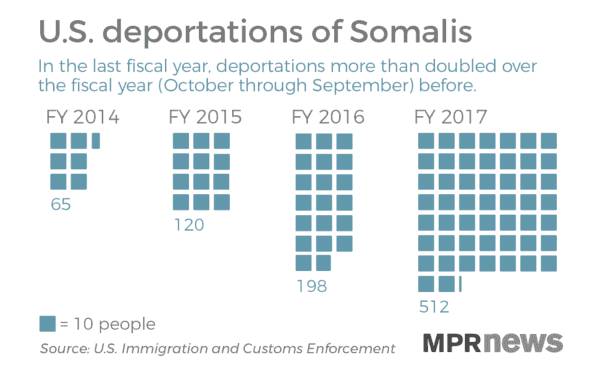For Minnesota Somalis, a Raw, Rising Fear of Deportation
Mukhtar M. Ibrahim, Minnesota Public Radio, December 13, 2017
{snip}
Minnesota immigration lawyers are scrambling now to get emergency stays for Hussein and other Somali clients who’ve been ordered deported by the U.S. Immigration and Customs Enforcement agency. Hussein’s flight included 91 other men and women; at least 10 were Minnesota residents.
Their families fear their loved ones could die in Somalia’s violence. The worry extends beyond those individuals who face deportation to those they leave behind. Their stories are heart-rending.
{snip}
More Somalis are being deported in similar fashion now than any other time.
ICE deported 512 Somalis from around the country from October 2016 through September 2017, compared to 198 during the same period a year earlier, according to the agency’s data.
Lawyers and advocates say a majority of those deported in the 2017 fiscal year happened under the Trump administration. There are more detentions, more arrests and more people held in jail pending their deportation than before, according to immigration lawyers.
{snip}
Ceja-Orozco and other attorneys are scrambling to get emergency stays for their clients in the hope of re-opening their cases by arguing that it’s dangerous to send people to Somalia. Many note the recent bombings in Mogadishu in October, where more than 500 people were killed.
Immigration lawyers also say the U.S. government is not taking that into account when it deports Somalis, some who have lived in the United States for decades and don’t know much about their homeland.
Federal immigration officials say they are just enforcing the law.
“ICE promotes public safety and national security by ensuring the departure from the United States of all removable aliens through the fair and effective enforcement of the nation’s immigration laws,” Raedy said.
The United States formally recognized the Somali government in 2013 after decades of no diplomatic relations between the two countries. In June 2016, the first U.S. ambassador to Somalia in 25 years was sworn in.
The country still continues to grapple with security, unemployment, drought and other longstanding challenges as it slowly tries to recover from decades of violent conflict.
While the U.S. military continues to hunt terrorists in Somalia with drones, the Trump administration has placed travel restrictions on that country and five other mostly Muslim countries.
Since 2014, the number of Somalis deported to Somalia has been increasing. In the 2017 fiscal year alone, the U.S. sent five charter flights full of deportees to Somalia.
If the current pace of deportations continue to rise, more Somalis could be deported to Somalia in the 2018 fiscal year than being admitted into the United States.
{snip}
















